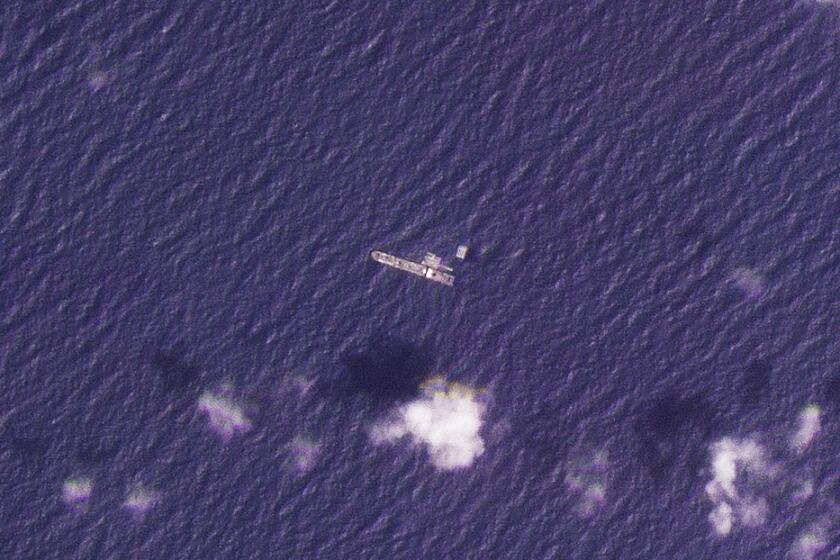Yeltsin Sneaks Out of Hospital, Names Guard to Top Post
Russian President Boris N. Yeltsin ended a two-week hospital stay Monday and moved to a rural spa, where he was said to have directed a high-level shake-up of the Federal Security Service, the domestic successor to the dreaded KGB.
But Yeltsin’s furtive relocation and reports of his appointment of a senior Kremlin bodyguard to head the revamped intelligence network intensified fears that the ailing, reclusive president is increasingly under the influence of his own security entourage.
The appointment of Col. Gen. Mikhail I. Barsukov as the new chief of security, espionage and anti-terrorism raised eyebrows in political circles because he has no intelligence background and had little to recommend him for the position, aside from a close alliance with Gen. Alexander V. Korzhakov, Yeltsin’s own shadowy security director.
The respected evening newspaper Izvestia commented in a front-page editorial after the appointment was announced that Barsukov’s most relevant qualifications appeared to be “his participation in fishing and hunting trips” and his frequent appearance “around the table” with Korzhakov and other Yeltsin confidants.
Yeltsin’s move from the Central Clinical Hospital to a sanatorium west of Moscow in the village of Barvikha was conducted without announcement and out of sight of even officially sanctioned media. The handling of the move befitted the secrecy of the Communist era more than the accessible style of leadership that was promised by Yeltsin’s latest press secretary when he took office four months ago.
Yeltsin’s spokesman, Sergei K. Medvedev, made the announcement that the president left the hospital after undergoing treatment for an ailment that was restricting the supply of blood to his heart--but Medvedev had obviously not seen the president himself in the course of Yeltsin’s release. Instead, Medvedev responded to inquiries about Yeltsin’s condition by referring to doctors’ reports stating, “The president is feeling well.”
The same footage of a speeding motorcade, without even a glimpse of Yeltsin, was shown on both state-run TV news programs and on independently produced news shows.
After an incident last week in which Kremlin advisers presented a 3-month-old photograph of Yeltsin in their bid to assuage fears about the president’s health, his unobserved hospital departure Monday added fresh fuel for speculation that officials were exaggerating the extent of his recovery.
The Interfax news agency, quoting “well-informed Moscow sources,” reported that Yeltsin gathered Federal Security Service chiefs at the Barvikha resort and introduced Barsukov to other top agency officials. Interfax said the collegium decided to name eight deputy ministers for the security agency and reported without elaboration that Yeltsin had ordered other revisions to last month’s presidential decree on reorganizing the modern-day KGB.
Barsukov, 47, has headed the Kremlin bodyguard service since June, 1992. He was trained in Soviet-era military academies but has never been known to have been involved in intelligence or anti-terrorism work.
Mikhail P. Lyubimov, a retired KGB agent turned novelist, criticized the appointment as likely to lead to a further weakening of the agency. “I’m afraid what is going to happen is just another series of pointless pro forma reforms in the former KGB that has in recent years been reformed beyond recognition and stripped of the best qualities it once possessed,” he said.
Word of Barsukov’s appointment was leaked to Interfax a week ago, prompting Medvedev to deny that the president had made any decision thus far. Diplomatic observers speculated that the press secretary, who does not enjoy as much access to Yeltsin as Korzhakov does, either was not informed of the appointment or considered it inappropriate to announce a decision when the president was isolated from most of his political advisers.
Barsukov replaces Sergei V. Stepashin, who was fired last month along with the government ministers in charge of police and minority affairs for negligence in failing to prevent a deadly terrorist attack by Chechen rebels on the southern town of Budennovsk.
More to Read
Start your day right
Sign up for Essential California for news, features and recommendations from the L.A. Times and beyond in your inbox six days a week.
You may occasionally receive promotional content from the Los Angeles Times.







